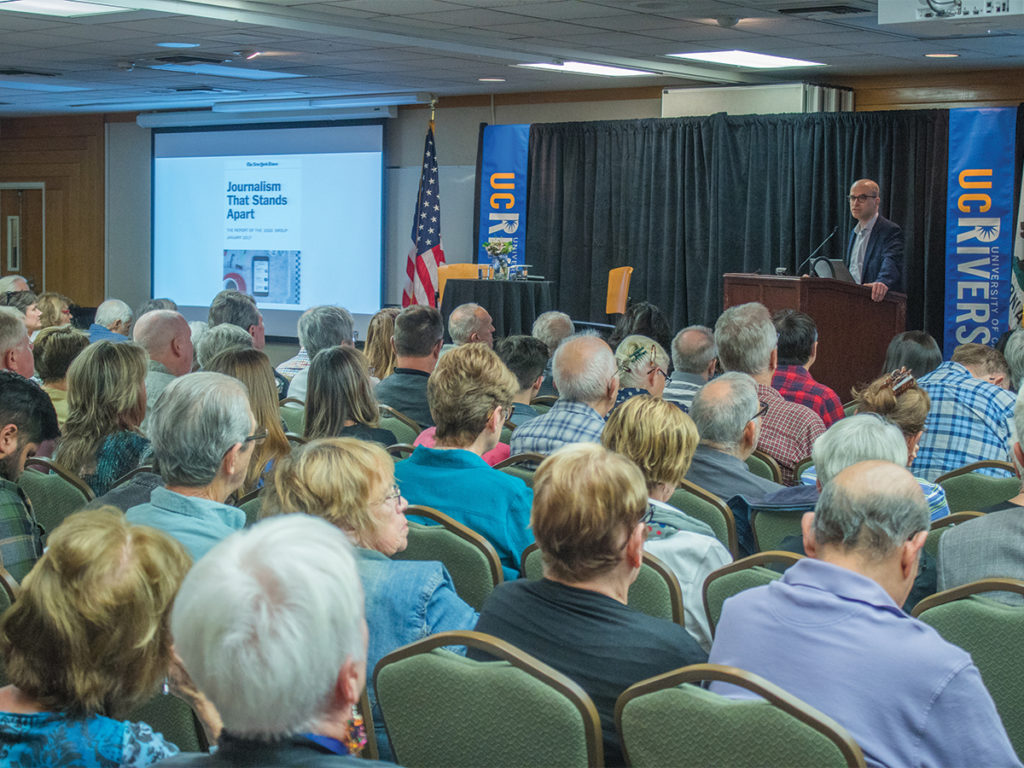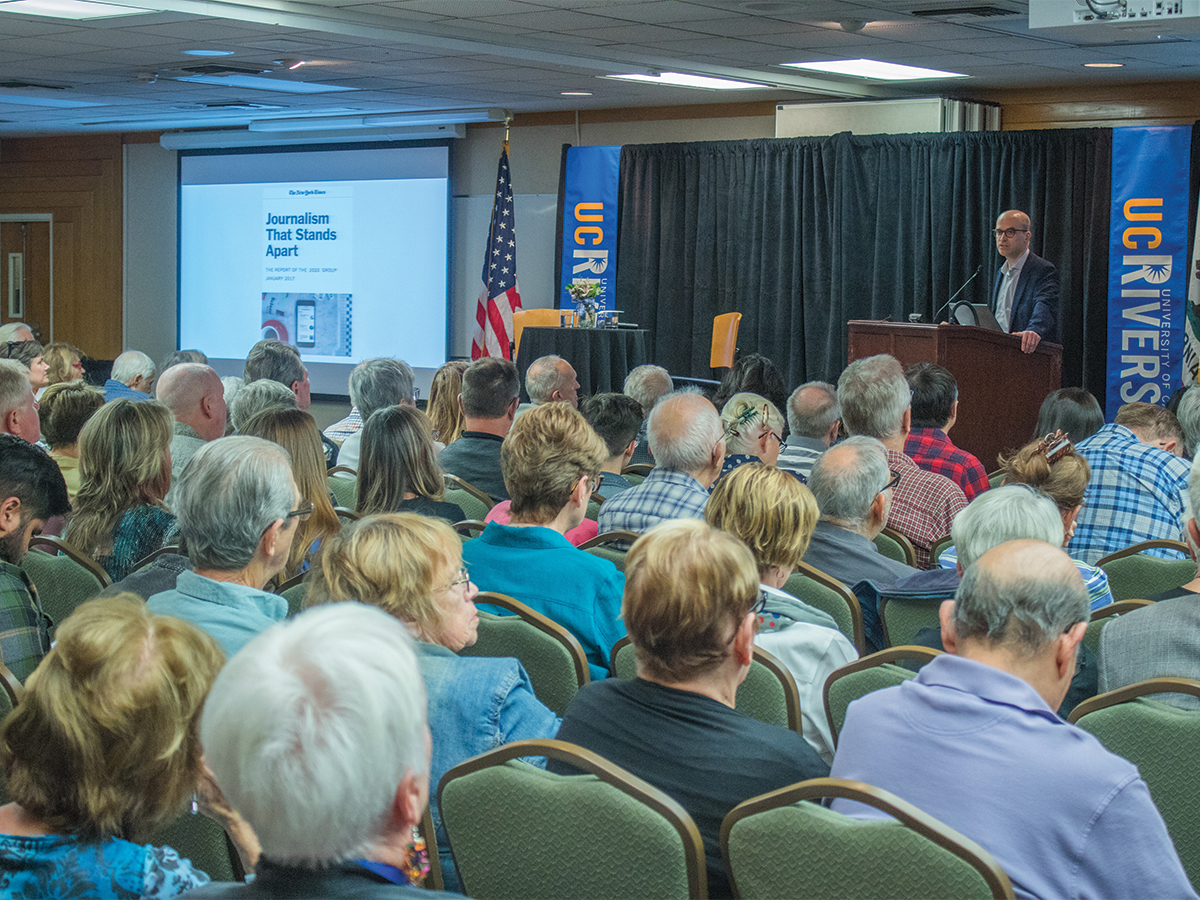On Thursday, Feb. 27, New York Times op-ed columnist David Leonhardt presented on both the evolution of modern journalism as well as some of the obstacles modern journalists face for the 51st Hays Press-Enterprise lecture. The event was held at the UC Riverside Extension Center.
Leonhardt is the latest in a long line of Hays Press-Enterprise lecturers and is most notable for receiving a Pulitzer Prize for commentary in April 2011 for his examination of America’s economy, especially with regards to the federal budget deficit and health care reform. Today, Leonhardt primarily opines on the upcoming 2020 United States presidential primary election.
UCR’s Chancellor Kim Wilcox began the event at 4:02 p.m. with a brief history of the Hays Press-Enterprise Lecture series.
The Hays Press-Enterprise lecture was started by Pulitzer Prize winning publisher Howard H. “Tim” Hays, Jr., then editor of The Press-Enterprise, in an effort to examine issues in the field of journalism. Chancellor Wilcox explained that the lecture series was endowed by Hays’ son Tom Hays in 2011 to ensure his father’s legacy — a legacy that Wilcox described as representing not only “a continuing connection between our university and the important region around us” but also “a connection between our university, our region, and the important issues of the day.”
Following this introduction, Leonhardt took to the stage and opened his lecture with an anecdote from his early days interning with the Washington Post during the summer of 1994. Near the end of his internship, Leonhardt wrote a story on the politics of building a sports arena in downtown Washington. In this article, Leonhardt misspelled the name of longtime Washington Post publisher Katharine Graham. The article made it to print before any corrections could be made.
Met with laughter from the crowd, Leonhardt explained that this mistake illustrates his first point: in many ways, journalism is much more healthy than it used to be. In today’s modern age, such a mistake “would go online, and in all likelihood, within minutes, some eagle-eyed reader would begin mocking the story and the person who wrote it” on social media, he stated. He continued to say that journalists are more accountable than they used to be.
Leonhardt then went on to explain that the gradual transition to digital platforms also affords journalists certain tools that improve the overall state of journalism. For starters, if a journalist misspelled a person’s name in an article, the publication would quickly be informed and a correction could be made to the digital edition. He also explained that a digital format allows journalists to make more comprehensive, eye-catching graphics — a technique Leonhardt often uses in his own articles.

Leonhardt acknowledged that current journalism is not without its failures, however. For starters, local journalism and print journalism both seem to be in crisis. “Newsroom employment has fallen by 25% since 2008,” Leonhardt explained, “and it’s probably down more than 50% from its peak, which was well before 2008.” This means that local events, like school board and city council meetings, are going uncovered. Leonhardt argued that this issue needs to be addressed, as less local coverage means that “our community doesn’t know itself.”
Furthermore, Leonhardt stated that Americans are especially distrustful of the media today. He attributes this decline in trust to the fact that living standards for many Americans have stagnated for the last 40 years. “Lifespans, arguably the single best measure of our quality of life have stopped growing for people without college degrees,” he explained, and this stagnated standard of living leads to distrust of not only the media but other pillars of society.
The third and final problem Leonhardt highlighted was the prevalence of disinformation thanks to what he called deepfake videos, misleading memes and outright falsehoods spread across the internet. “Today, many people only believe those sources that agree with them ideologically,” he stated.
In order to address these problems, Leonhardt argued that social media platforms must make an effort to combat the spread of disinformation by removing misleading content. On the topic of trust in the media, Leonhardt believes that journalists should put in extra effort to compensate for society’s discontent and rededicate themselves to doing their jobs well. This entails being open to criticism and being transparent about how they go about reporting a story. Finally, Leonhardt reaffirmed the importance of local journalism, imploring audiences to support their local papers.
To end his lecture, Leonhardt said that journalism matters more than many other industries because “it is, at root, in the business of educating citizens to live better lives and to participate in democracy.”
After Leonhardt’s presentation, Karen Kane, a 74-year-old social worker and attendee of the event, told The Highlander that this would be the fourth Hays Press-Enterprise lecture she has attended and that she had not heard a columnist speak on these issues before. She went on to say that “it was interesting to me to learn about the positives and negatives” of the field, and that she was surprised to learn that columnists like Leonhardt were so receptive to feedback.
When asked by The Highlander to elaborate on the future of print journalism specifically, Leonhardt admitted that he wasn’t sure how long print newspapers would be around, but “in terms of a daily news publication, I assume we are heading towards a world where that all happens digitally, both locally and nationally.”
The event ended at 5:30 p.m.








